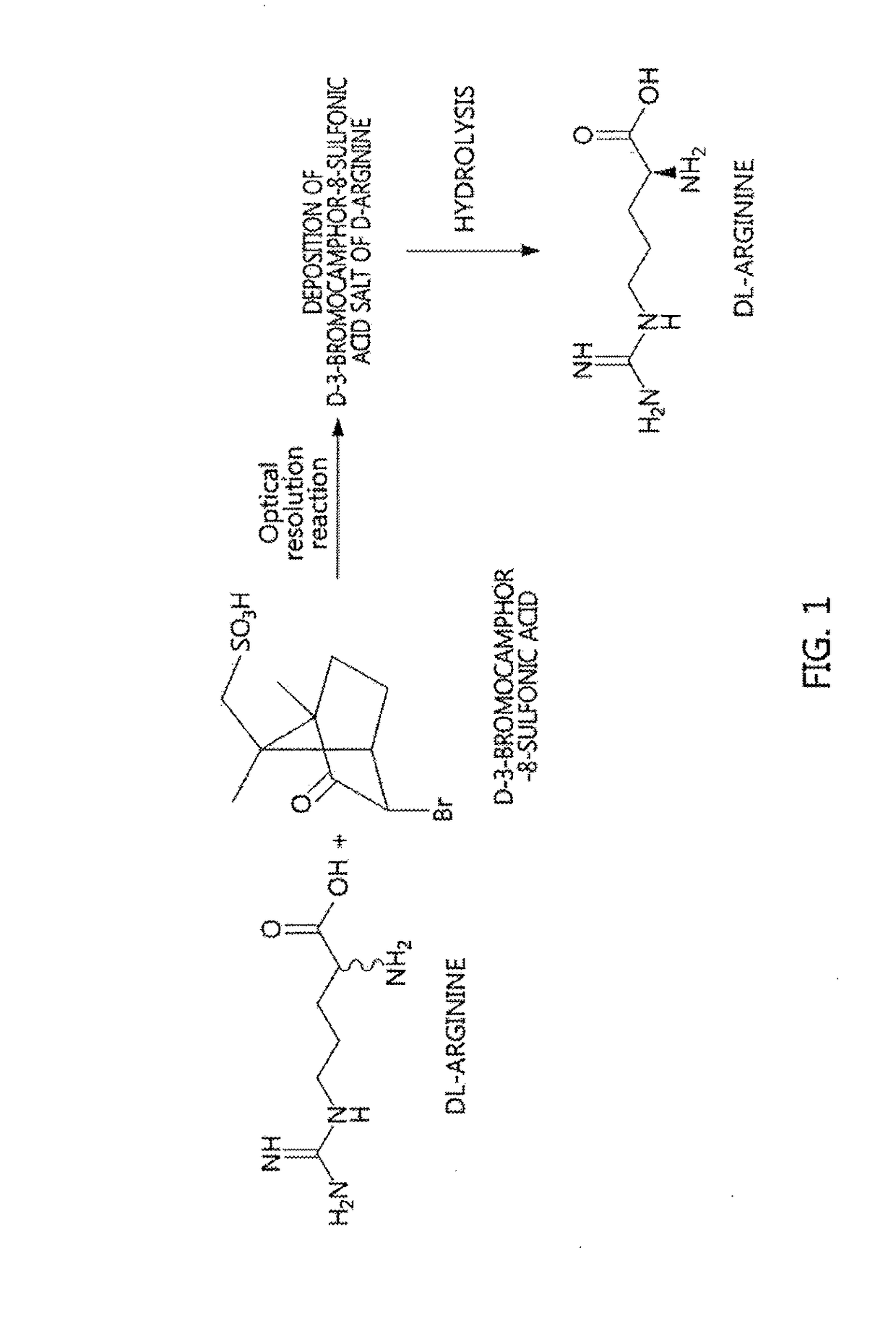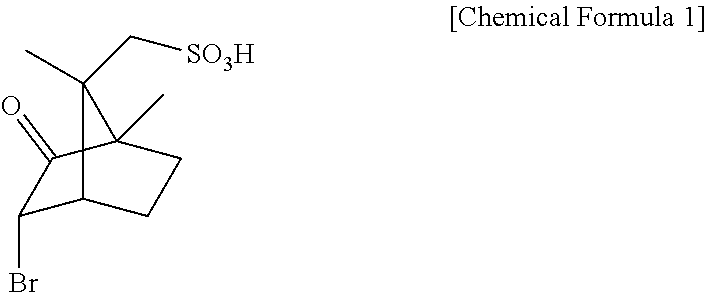Method for preparing d-arginine
a technology of d-arginine and d-arginine, which is applied in the field of preparing darginine, can solve the problem of inability to accurately confirm the optical purity of the obtained d-arginine, and achieve the effects of improving the optical purity of d-arginine, simplifying processing steps, and outstanding optical resolution
- Summary
- Abstract
- Description
- Claims
- Application Information
AI Technical Summary
Benefits of technology
Problems solved by technology
Method used
Image
Examples
example 1
[0031]200 mL of methanol and 80 mL of acetic acid were added with DL-arginine (10 g, 57.4 mmol) and D-3-bromocamphor-8-sulfonic acid ammonium salt (18.8 g, 57.4 mmol), heated to 50° C. to thus be dissolved, and then slowly cooled.
[0032]The resulting solution was stirred at 5° C. for 3 hr, and the deposited D-3-bromocamphor-8-sulfonic acid salt of D-arginine was obtained through filtration.
[0033]Thereafter, the salt was dissolved in distilled water and passed through a column packed with an ion exchange resin (IRC-86, NH4 type) to adsorb D-arginine, after which the adsorbed D-arginine was desorbed using 5% ammonia water, and the resulting desorbed aqueous solution was concentrated again, thus yielding D-arginine.
[0034]The optical purity of the D-arginine thus obtained was analyzed using a chiral column (Sumichiral OA-5000 column). The analysis conditions were as follows.
[0035]Column: Crownpak CR(+)
[0036]Mobile phase: Perchloric acid aqueous solution (HClO4) at a pH of 1.5
[0037]Detect...
example 2
[0039]400 mL of propionic acid was added with DL-arginine (20 g), D-3-bromocamphor-8-sulfonic acid ammonium salt (39.6 g) and salicylaldehyde (1.1 g) and then heated to 60° C.
[0040]The resulting solution was stirred at 60° C. for 25 hr and cooled to room temperature, after which the deposited D-3-bromocamphor-8-sulfonic acid salt of D-arginine was obtained through filtration.
[0041]Thereafter, the salt was dissolved in distilled water and passed through a column packed with an ion exchange resin (IRC-86, NH4 type) to adsorb D-arginine, after which the adsorbed D-arginine was desorbed using 5% ammonia water, and the resulting desorbed aqueous solution was concentrated, thus yielding D-arginine.
[0042]The optical purity of D-arginine thus obtained was analyzed using a chiral column (Sumichiral OA-5000 column) under the same conditions as in Example 1.
[0043]Based on the analysis results of the optical purity of D-arginine under the above analysis conditions, 15.7 g of the obtained D-argi...
example 3
[0044]1000 mL of propionic acid was added with L-arginine (50 g), D-3-bromocamphor-8-sulfonic acid ammonium salt (94.2 g) and salicylaldehyde (1.7 g) and then heated to 65° C.
[0045]The resulting solution was stirred at 65° C. for 20 hr and cooled to room temperature, after which the deposited D-3-bromocamphor-8-sulfonic acid salt of D-arginine was obtained through filtration.
[0046]Thereafter, the salt was dissolved in distilled water and passed through a column packed with an ion exchange resin (IRC-86, NH4 type) to adsorb D-arginine, after which the adsorbed D-arginine was desorbed using 5% ammonia water and the resulting desorbed aqueous solution was concentrated, thus yielding D-arginine.
[0047]The optical purity of the D-arginine thus obtained was analyzed using a chiral column (Sumichiral OA-5000 column) under the same conditions as in Example 1.
[0048]Based on the analysis results of the optical purity of D-arginine under the above analysis conditions, 38.2 g of the obtained D-a...
PUM
| Property | Measurement | Unit |
|---|---|---|
| temperature | aaaaa | aaaaa |
| temperature | aaaaa | aaaaa |
| ion exchange | aaaaa | aaaaa |
Abstract
Description
Claims
Application Information
 Login to View More
Login to View More - R&D
- Intellectual Property
- Life Sciences
- Materials
- Tech Scout
- Unparalleled Data Quality
- Higher Quality Content
- 60% Fewer Hallucinations
Browse by: Latest US Patents, China's latest patents, Technical Efficacy Thesaurus, Application Domain, Technology Topic, Popular Technical Reports.
© 2025 PatSnap. All rights reserved.Legal|Privacy policy|Modern Slavery Act Transparency Statement|Sitemap|About US| Contact US: help@patsnap.com


